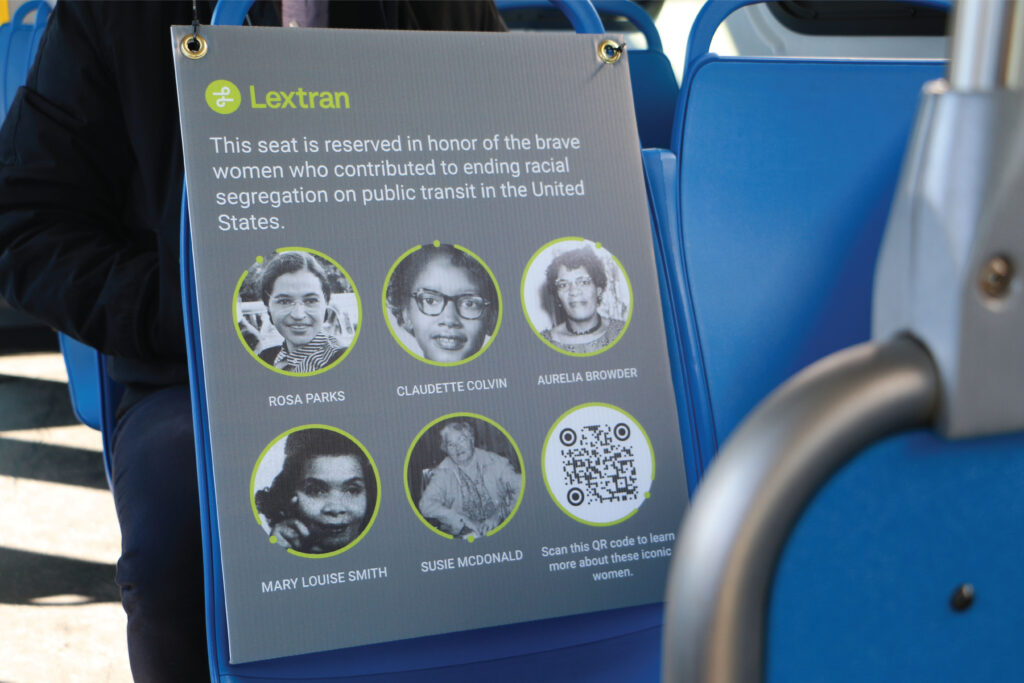February 1, 2021
Lextran is kicking off Black History Month by reserving a seat on each bus in honor of Rosa Parks and the women involved in the Browder v. Gayle case. In 1956, this historic case ruled racial segregation on public transit unconstitutional under the Equal Protection Clause of the 14th Amendment.
The reserved seats feature a poster with photos of Rosa Parks, Claudette Colvin, Aurelia Browder, Mary Louise Smith, and Susie McDonald. The posters will be placed on the buses on February 4 (Parks’ birthday) and remain through February 28.

Lextran has honored Parks in the month of February since 2019, by reserving a seat in her name onboard each vehicle.
“This year, in addition to the seat we traditionally reserve for Rosa Parks, we wanted to tell more of the story with the inclusion of the other women,” said Jill Barnett, Lextran General Manager. “Rosa Parks is a civil rights icon, and most people are familiar with her impact. The other four women tend to be overlooked, though they were equally influential in ending segregation on public transit.”
At the age of 15, Claudette Colvin was on her way home from high school on March 2, 1955 in Montgomery, AL. When she was told to move to the back of the bus to make room for white passengers she refused which ultimately led to her arrest. After her arrest, due to her age and the fact that she became pregnant outside of marriage, civil rights leaders decided she was not best suited to be the symbol or icon behind the movement to end segregation on public transit.
One month later, in April of 1955, Aurelia Browder was arrested for sitting in the white section of the Montgomery city bus. Following her involvement as the lead plaintiff in the Browder v. Gayle case, she continued to be and active member of the National Association for the Advancement of Colored People (NAACP), the Montgomery Improvement Association (MIA) and the Southern Christian Leadership Conference (SCLC).
In October of 1955 another two women were arrested for refusing to give up their seats on buses in Montgomery. Mary Louise Smith and Susie McDonald were both arrested for breaking the segregation laws. Similar to Colvin, both women were not chosen as the figure to base the class action lawsuit or the bus boycott around due to their ages, Smith was 18 and McDonald was in her seventies.
In December of 1955, Rosa Parks famously refused to give up her bus seat to a white man on her commute home. The building frustrations around segregated seating led to the Montgomery Bus Boycott immediately following her arrest.
On February 1, 1956, civil rights attorney Fred Gray filed the Browder v. Gayle case in the U.S. District Court with Colvin, Browder, Smith, and McDonald as the plaintiffs.
While the bus boycott was gaining national attention, the Federal District Court for the Middle District of Alabama was reviewing the Browder v. Gayle case.
On June 5, 1956, the court ruled that Alabama and Montgomery bus segregation laws were unconstitutional.
The state and city appealed to the U.S. Supreme Court which upheld the initial ruling.
On December 17, 1956, the state was denied a petition for a rehearing. Three days later, the ruling was implemented when Montgomery mayor W.A. Gayle was given official written notice by federal marshals lawfully ending segregation on public transit in the United States.
The Lexington Public Library provided this link which provides readers with a catalog of books and references regarding African American History.
